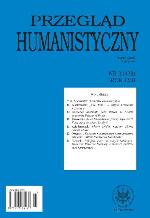Bieguny północne. Georga Brandesa wrażenia z Polski w świetle historii kultury duńskiej
Turned Polars. Georg Brandes's Impressions of Poland in the Light of the History of Danish Culture
Author(s): Włodzimierz Karol PesselSubject(s): Cultural Essay, Political Essay, Societal Essay
Published by: Wydawnictwa Uniwersytetu Warszawskiego
Summary/Abstract: Georg Brandes (1842–1927), a leftist social critic, historian of culture and literature and philosopher, was one of the most influential figures in the history of Danish culture of the last hundred and twenty years. He also influenced the whole Scandinavia and Western 112 Włodzimierz Karol Pessel Europe, in particular as an advocate of Ibsen and Strindberg. Whereas in the Polish culture and scholarly literature there is a certain tradition of the “Golden Age of Denmark”, connected with the emergence of the Romanticists (Søren Kierkegård, Hans Christian Andersen and Nicolas Grundtvig), we decidedly lack knowledge of the realistic breakthrough (det moderne gennembrud) after the year 1864, whose worldview was expressed by Brandes. This Danish modern turn in the sphere of attitudes, customs and axiology, supported by the processes of the social self-organizing, in fact meant that Denmark entered the path of welfare, social reforms, formation of egalitarian culture and liberal consensus. Without the progressive moderne gennembrud there would be no twentieth-century Denmark, a small country whose huge cultural capital intrigued the historians of civilization such as Norbert Elias or Jerzy Jedlicki. Brandes visited Poland (than under partitions) three times. The record of his impressions, as this word (indtryk) appears in the original title (Indtryk fra Polen), is an essayistic report from the year 1888. There have been few studies of it up until now (e.g. by Zenon Ciesielski or Ewa Paczoska), which contained historical and literary analyses. This article serves, firstly, to situate Brandes’s views in the context of the civilizing process in Denmark, and, secondly, it places in the critical light the cultural conditions of the so-called cultural relations between Danes and Poles. From the point of view of Scandinavian and cultural studies Brandes is not so much a cordial, culturally wanted “friend of Poles” than a follower of a kind of thinking about the “Polish cause” typical for the intellectuals of all Nordic countries, which was represented in Denmark by the politician Hans Peter Hanssen and the philologist Carl Wilhelm Smith, among many others. Trans. M. Bucholc
Journal: Przegląd Humanistyczny
- Issue Year: 438/2012
- Issue No: 01
- Page Range: 97-112
- Page Count: 16
- Language: Polish
- Content File-PDF

